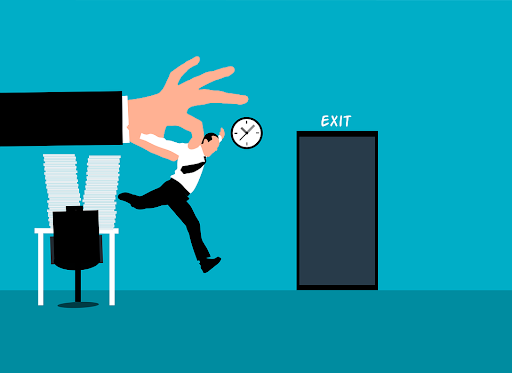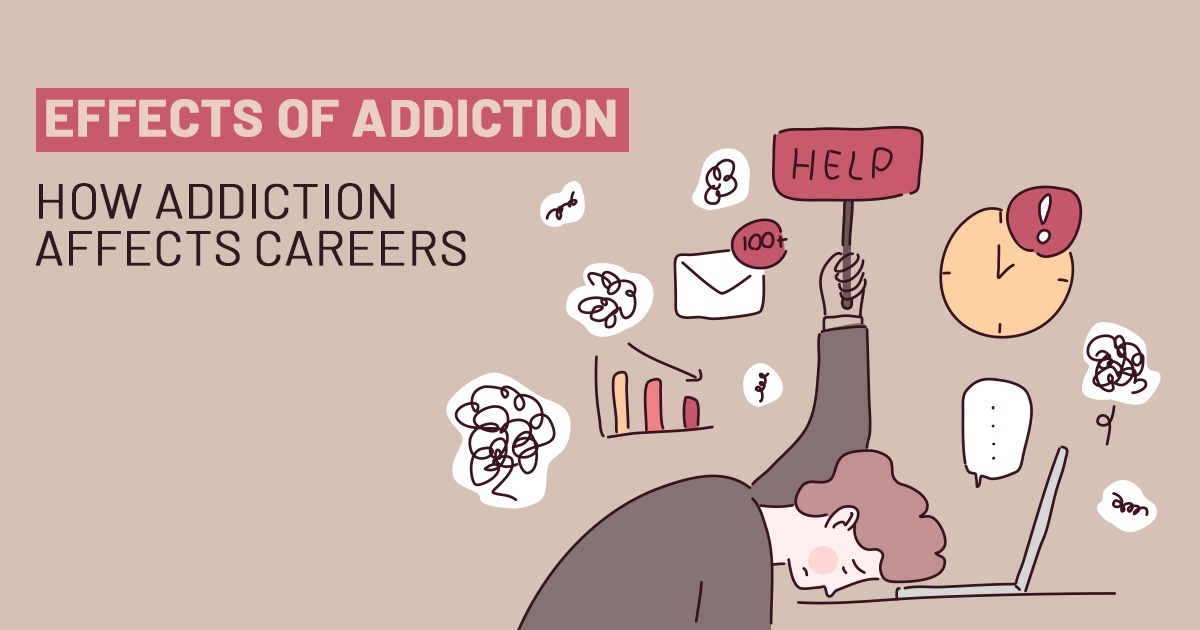The impact and effects of addiction to alcohol or an illicit drug won’t leave any area of your life untouched. At first, when you’re struggling with alcohol or drug abuse, you may be able to hide the effects. You may be able to section off your life so that your drug or alcohol use doesn’t affect your career or relationships.
Then, since addiction is a progressive disease, eventually, you won’t be able to do this anymore. The effects of addiction will end up extending to your marriage or other meaningful relationships, your physical and mental health, your career, and your finances.
You may even experience legal consequences because of your addiction to alcohol, illegal drugs, or a prescription drug.
If you aren’t yet to the point where there are severe effects, the best thing to do is get help before your substance use disorder worsens. If you do feel like you’re at rock bottom, help is still your best option.
The Effects of Addiction
When you have an addiction to drugs or alcohol, you experience compulsive seeking and use of substances. Even though you know and see the harmful effects of this drug abuse on aspects of your life, you can’t stop. The initial choice to use drugs or alcohol may have been within your control, but when you have an addiction, it’s not.
There are complex ways drugs and alcohol use disorders affect the brain. One of those effects is on your reward cycle. By activating your brain’s reward cycle and the effects of drugs on certain brain chemicals, you lose control of your use.
Using the drug you’re addicted to becomes your number one focus. You’ll likely give up other interests, activities, and priorities for your addiction. These are symptoms of a substance use disorder that an addiction professional can use to make a diagnosis.
Health Effects
By the time someone receives addiction treatment, they often have at least one co-occurring medical condition, physical or mental.
Drug users in the United States have higher risk factors of associated health problems, including:
- Heart disease
- High blood pressure
- Lung disease
- Stroke
- Cancer
- Dental problems
- Damaged nerve cells in the brain or peripheral nerve system
- Infectious disease risks such as hepatitis C or HIV
- Higher risk of being involved in accidents, including car accidents
If you have an addiction and a physical dependence and stop using the substance suddenly, you may go through withdrawal symptoms. Physical symptoms of withdrawal from an addictive substance can be severe and may require medical attention.
About 100 trillion bacteria live inside your digestive system, and each strain of bacteria has both good and bad effects. Researchers are now looking more closely at how this system of organisms in your gut influence several health conditions ranging from heart disease and cancer to arthritis and liver disease (Harvard Health, 2016). More specifically, a research team led by Dr. Bernd Schnabl at the University of California, San Diego, explored how gut microbes contribute to alcoholic hepatitis, a life-threatening form of alcohol-associated liver disease (AALD) caused by heavy drinking over time (National Institutes of Health, 2019). To understand this study, let’s first take a look at the facts on AALD, the signs of alcoholic hepatitis, and how your gut has more power than you realize.
Signs of Alcoholic Hepatitis
Symptoms of alcoholic hepatitis include inflammation of the liver, jaundice (skin yellowing), and, if not treated, ultimately liver failure and death. As treatment for alcoholic hepatitis is limited, liver transplantation is the only cure. In severe cases, more than half of patients die within two months of diagnosis. Other signs and symptoms of the disease include:
- Loss of appetite
- Nausea and vomiting
- Fatigue and weakness
- Abdominal tenderness
- Low-grade fever (Mayo Clinic)
Mental Disorders
Along with co-occurring physical effects of drug abuse or alcohol abuse, someone with an addiction to drugs or alcohol may have co-occurring mental health disorders. A mental health disorder can occur before addiction and may contribute to it. Mental illness can also arise because of addiction and the effects of some substances on brain structure and function.
Since drugs and alcohol affect the brain, they also impact your behavior, emotions, and thoughts.
There are short- and long-term effects on how your brain processes and receives information.
Legal Effects
When you struggle with alcohol or addictive drugs, you’re more likely to do illegal things because you aren’t thinking clearly. People who use drugs or alcohol may be more likely to steal or deal drugs; for example, Driving under the influence is another common legal situation for people with addiction disorders.
You might face legal issues like divorce or loss of custody if you have a child directly stemming from drugs or alcohol.
People who are under the influence of mind-altering substances are more likely to engage in violence, such as fighting or domestic violence, which are scenarios that can also lead to legal problems.
It’s very common for a life of long-term addiction to lead to some form of theft or burglary. Addiction is a disease and those who are struggling often steal money, objects of value, or other things in order to support their drug or alcohol problem. In fact, stealing is a sign that someone has a substance use disorder. Burglary is considered a felony in most states and in California, the burglary law (Penal Code 459) is divided into first-degree and second-degree felonies.
Financial Issues
There are a few ways addiction affects you financially. First, you may be spending money on drugs or alcohol. You might also engage in expensive activities like gambling that you wouldn’t if you weren’t drinking or using drugs.
You could end up paying court fees or fines, which affects you financially as well.
Effects On Your Family
Addiction is profoundly damaging to your family members, loved ones, and friends. Your family may lose trust in you. You might break your promises to them, or your drinking or drug use could lead to arguments. Your family could end up avoiding you altogether until you get help, or maybe you avoid them.
Your friendships are going to be affected by addiction too. Your friends may be embarrassed because of things you do when you’re under the influence, or they may stop trusting you. Your friends may tell you they think you should cut back on drinking or using drugs, which could cause you to be defensive or hostile.
Hobbies and Interests
When you develop an addiction, you will give up other activities you once enjoyed. Your time is spent either obtaining drugs, using them, or recovering from the effects. You no longer have an interest in more productive hobbies or interests.

How Addiction Affects Careers
If you have a career or own a business, untreated substance abuse will cause severe destruction. It becomes impossible as your addiction gets more severe to maintain your focus on your career. You may be able to hide it for a while as a functional addict, but eventually, it will affect your job performance.
Drug or alcohol use will:
- Make you scatterbrained or forgetful. Your mental state starts to decline. You may overlook critical details.
- You’re more likely to become depressed, irritable, or experience other changes in your mood. This will impact how you get along with people in your work environment, including co-workers, your boss, or your employees (if you own a business.)
- Just like it’s difficult to manage other hobbies when you have an addiction, it’s tough to prioritize your career because drinking or drugs become your top priority.
- There are often changes in someone’s appearance and even their hygiene when they struggle with addiction. Those changes can cause people to be suspicious or perhaps not want to interact with you professionally.
- You may experience extreme fatigue and a general lack of energy, so you can’t put your best effort into your work.
- People dealing with chemical dependence are more likely to be late, miss deadlines, and be absent from work. This affects your ability to move forward in your career.
- Your physical health will begin to decline, and you’ll have to miss work because of that.
- You may become dishonest because of your addiction and lose the trust of your boss or employees.
- If you have problems in other areas of your life, such as financial issues, these could become problems in your workplace.
- If you’re a high-performer, you were probably very creative, innovative, and focused on solving problems. Drug or alcohol use can sap you of all of those things.
So what can you do if you notice the effects of addiction on your career or business?
The first step, once you acknowledge the problem, is to get help from a treatment facility. During an addiction treatment program, you can not just take steps to stop using drugs or alcohol. You can also do the necessary work to get the rest of your life back on track, including your career.
Once you have your initial addiction under control, we encourage you to call 833-844-4769 and take advantage of Silver Lining Recovery’s outpatient and aftercare services in Huntington Beach, CA.

